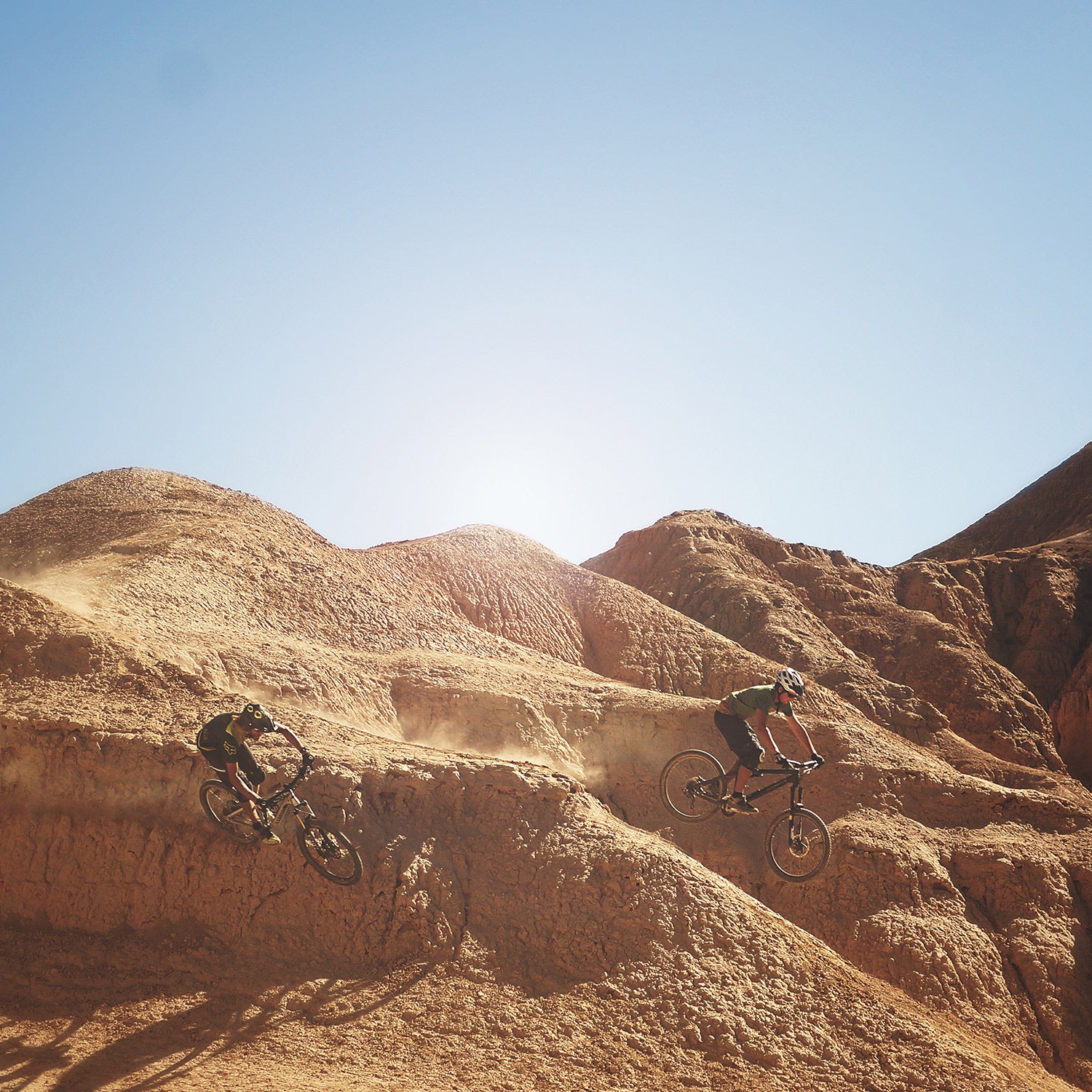Earlier this year, my colleague and friend Chris Solomon made a cogent five-point argument as to why mountain bikes should be kept out of federally designated Wilderness. His emotional editorial was in response to , at the time, a new Senate bill that aimed to reverse the ban keeping bikes out of these protected places. More recently, a simpler house bill () has riled up conservationists and fractured the mountain biking community into camps.
Solomon’s polarized editorial naturally drew a polarized response. But, as is often the case with polemics, the extremes are out of whack. There is a better, more moderate, way forward. But first let’s take a look at the arguments.
The boiled-down position from Solomon and the staunchly anti-bikes-in-Wilderness crowd is this: these are bad bills that will destroy Wilderness. Bikes have been banned from Wilderness since 1964 for a reason, they allege. To hard-core conservationists, mountain bikers are essentially loam-fiends willing to trade our ecological jewels for cheap-thrill funhogging. Solomon also claims that mountain bikers haven’t really lost any access to trails due to Wilderness designations, and thus shouldn't be clamoring for more. Mountain bikers, in this world view, are anti-fact, anti-science truth deniers using alt-right techniques to lie their way into Wilderness so they can blow past Sierra Clubbers at soil-their-khakis speeds.
I take issue with a few of these points. First, for the initial 20 years, the administrators of the Wilderness Act waffled on whether bikes were actually banned from Wilderness. Finally, in 1984, acting on one public comment, the Forest Service permanently banned bikes. No reasonable person would say the ban was chiseled into granite from day one.
Secondly, mountain bikers have indeed lost trails to Wilderness designations in states like Oregon, New Mexico, California, Montana. (Montana alone has lost 650-plus miles of trail, to Wilderness, Wilderness Study Areas and Recommended Wilderness Areas according to Bob Allen, co-president of the Montana Mountain Bike Association.) You might also have heard about what happened in Idaho in 2015, where one of the most cherished backcountry trails in the sport—the legendary Castle Divide Trail in the White Cloud Mountains—was wiped off the singletrack map. And given the many Wilderness Study Areas currently under consideration for Wilderness designation, more trail networks will certainly be lost in the future. (Though granted, turning a WSA into Wilderness requires an act of Congress, which at the moment seems unlikely). If you’re a mountain biker living in Stanley, Idaho, or Hamilton, Montana and you just lost the backdoor trails you and your club have been maintaining for decades, Wilderness is no longer an esoteric concept—it’s a threat to the sport and the community you love.
(As an aside, the White Clouds fiasco came about after Republican lawmakers decided to curtail former President Barack Obama’s power of executive action. Obama intended to turn the area into the White Clouds National Monument, which would have allowed mountain bikes. Out of spite, Congressional Republicans turned it into Wilderness instead. Given what just went down with Bears Ears, that’s a bittersweet victory for conservationists.)
To deny that Wilderness designations have impacted mountain bikers is extremist hyperbole. But polarization means there’s an extreme flip side, too. Enter mountain-biking advocacy group , which has . The STC formed because a subset of the national mountain bike community thought the International Mountain Bicycling Association played too nice with other conservation groups. In the few years since, it's become a harder-edged voice for mountain-bike advocacy. In a good cop/bad cop scenario, IMBA is the Andy Griffith voice of reason and the STC is Harvey Keitel in Bad Lieutenant.
To be clear, the new bill would end the blanket ban on bikes (and wheelbarrows and strollers). But the fallout of that reversal is up for debate. The STC’s official position is that the blanket ban isn’t getting replaced with a blanket reversal, and that local land managers would have the power to open existing trails to bikes only if doing so wouldn’t degrade the land. The STC contends that the more likely scenario would open only a handful of trails where mountain biking predates closures or where there are existing networks. “Every single Wilderness area and the people that manage them could write a closure to prohibit bikes while they figure things out,” says STC board member Jeff Barker. To which, Salomon and the broader conservation movement respond that land management doesn’t work that way and “the bill opens the wilderness gates to bikes, everywhere, without qualification.”
Where will the truth shake out? Right now, it’s impossible to say. Even if the bill becomes law, Wilderness land managers would still be duty bound to protect the resource. How they balance that mandate with mountain bike access will remain a mystery until and if the law goes into effect. It’s still a tremendous long-shot given the predicted lawsuits that would arise and the likelihood of future shifts in the political status quo.
But what Solomon and the rest of the conservation movement should know is that the broader mountain biking community is not of one mind on this issue. STC does not speak for all mountain bikers. In fact, IMBA went to Capitol Hill to speak out against HR 1349. In to its members it said:
IMBA’s mission does not include amending the Wilderness Act and never has. In 2016, IMBA’s board of directors reaffirmed our position on this issue, which is to respect both the Act and the federal land agency regulations that bicycles are not allowed in existing, Congressionally designated Wilderness areas. This does not mean that we are content with the present situation on these vital and revered public lands.
Hey, IMBA agrees with you, Chris!
But IMBA, which claims north of 40,000 members, and is mountain biking’s largest bike advocacy group, doesn’t speak for all mountain bikers either—or even all its member chapters apparently. This week, the Boulder Mountainbike Alliance (in Colorado; and full disclosure, I’m a lapsed member) came out in opposition to IMBA’s position and joined the New England Mountain Bike Association and the San Diego Mountain Bike Association in support of a petition demanding IMBA stop actively advocating against bikes in Wilderness. Other clubs and chapters are getting in line.
As Aaron Teasdale foretold in 2016 in Mountain �������������Ա�’s , the Wilderness debate has now riven the advocacy community. Hell, it’s riven me (and full disclosure, I am the editor of Mountain). The Castle Divide Trail was on my life list. And I empathize to the point of tears with the mountain bikers of Montana’s Bitterroot Valley that lost 178 miles of trail.
But at the same time I can’t help thinking that IMBA's is the sensible approach. HR 1349 is a potentially insidious bill backed by anti-environmental Republicans who want to weaken land protections. That’s not an ad-hominem attack as STC defenders would posit. You can’t ignore the possible larger motives here. The Republican lawmakers behind the legislation have long anti-environmental histories. Might they be using the STC to attack Wilderness in the same way their colleagues are attacking a woman’s right to choose, one niggling detail at a time? If electric wheelchairs are okay, what’s next? Electric mountain bikes and ATVs? Do we really need to ride bikes on every scrap of high alpine land because underfunded land managers are too overwhelmed to distinguish between what’s right and wrong for the landscape? In the case of Wilderness, first you overturn the blanket ban on bikes, then a decade from now when Donald Junior is president, you build roads for golf carts.
None of this is to say that the STC intends malice, as Solomon and the conservationists infer. If I had to guess, I’d say that the STC did indeed want a scalpel approach, not the current meat cleaver. But cleavers happen when you get in bed with the butcher. Without a guarantee that the bill won’t open all Wilderness trails to bikes, I’m not willing to make that Faustian bargain.
Anyway, there's a better, more reasonable solution. If IMBA is to be believed, most mountain bikers do not want unfettered access to existing Wilderness. But they do want a seat at the table when future designations are discussed. With a touch of nuance, we can have mountain biking and Wilderness, while protecting the latter. As Teasdale reported, “Convincing land managers and conservationists that there are effective alternatives and tweaks to Wilderness designations is the first step.”
In Missoula, where I rode off-trail extensively in graduate school, the nearby Wilderness is fronted by a National Recreation Area that sustained the town’s much loved multi-use, human powered mountain trails. Similar designations in Colorado and California saved mountain bike trails by allowing land managers to sandwich non-motorized corridors between big parcels of Wilderness. The patchwork idea is a boon to local recreation economies, and it still allows for the highest degree of protection—Wilderness—in the rough and remote country where foot travel and only foot travel makes sense. IMBA, and the many millions of mountain bikers who don’t belong to either group, need to play nice to make that happen.
And who knows? As mountain bikers become land managers in the future, perhaps a surgical slice here and there could give cyclists back trail riding gems like the Castle Divide Trail without risking Wilderness as a whole. In specific locations, motor boats, cabins, and seaplanes were grandfathered into Wilderness as existing uses. Why not grant mountain bikers the same graces?
Maybe you don’t agree. Fair enough. But be careful how loudly you scream that all “mechanical transport” is prohibited in Wilderness areas. If you apply the rule too strictly to human-powered cyclists, someday a literalist from the conservation movement might do the same to backcountry skiers—employing the human powered mechanical transportation we call an alpine-touring binding. Ditto with those shock absorbing trekking poles. And how about the aging Sierra Clubbers with their knee replacements and mechanical hips? Should we ban them too? The very thought could soil a thousand pants.


